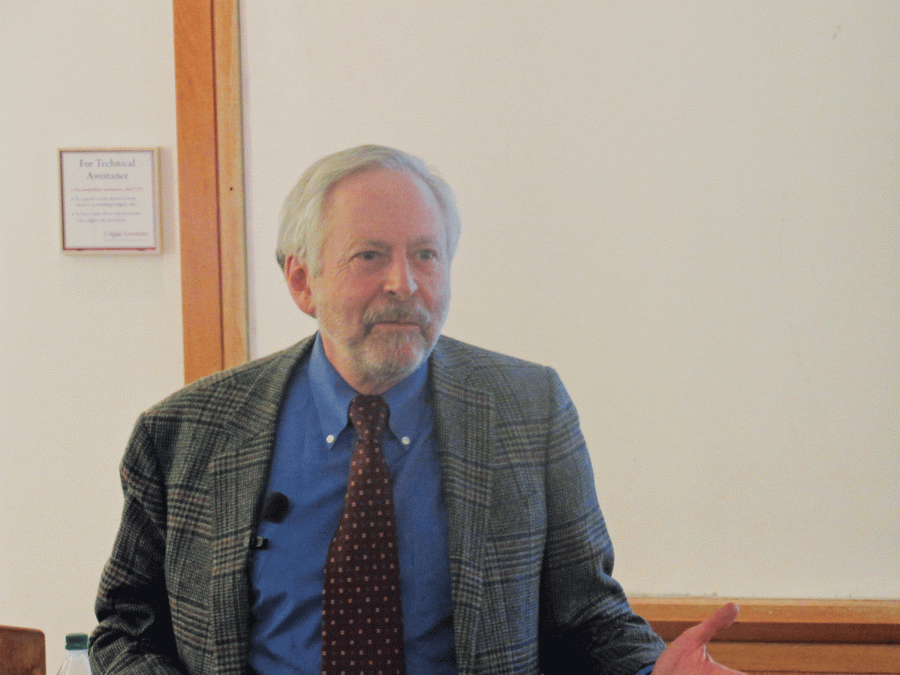Lustick Lectures Space and Place in West Bank
Professor Ian Lustick highlighted the important distinction between place and space for citizens like the Palestinians and Jews.
Professor Ian Lustick of University of Pennsylvania spoke on the Israeli-Palestinian conflict in a lecture titled “In Place, Out of Place, Out of Space: Palestinians and Jews in the West Bank,” on Thursday, March 29. This lecture was held in conjunction with the art exhibit “This Place,” which is currently showcased in the Picker Art Gallery. As a professor of political science, Lustick’s expertise is in comparative politics and international relations, with a focus on the Middle East.
Lustick began with a distinction that is fundamental to his research: place versus space. A place is associated with direct, experiential feelings, loyalties and affinities. In contrast, Lustick defines a space as an abstract demarcation of territory. Although nuanced, the difference between these seemingly interchangeable terms is vital to understanding the conflict.
Lustick explained that, historically, the Jews do not have a place. They are frequently described by the German term, luftmenschen, which directly translates to “air people.” This term understands Jewish peoples to be floating through the air, with no attachment to the ground, to a place. Collectively, they have a memory of a space. However, Jews today do not have the direct attachment to a place.
Lustick proposed that, consequently, the Jewish approach to nationalism is complicated. Jewish peoples wanted to create a state for themselves where they were the majority and so turned to the only space they knew: Israel. Lustick explained that although Britain drafted a plan for the establishment of a Jewish state in Uganda, this plan was rejected because it lacked connection to memory and there was longing for a space that once was a Jewish place.
When it finally became possible for Jewish populations to return to Israel, propaganda for the new state exaggerated the nature of the space. Lustick displayed advertisements that claimed “free land” was available, telling Jewish people, “This is your land, just come.” That the land was advertised as if it were empty and available for the taking had the effect of transforming the Palestinian Arabs into luftmenschen themselves.
In his discussion of the Palestinian’s approach to nationalism, Lustick pointed out that Palestinian Arabs had a connection to a place. Now, nevertheless, Palestinians are forced out of their places. Palestinians are being asked to redefine their understanding of their space, and form new attachments to places that are not theirs.
In understanding the Jewish desire to establish a place in the memory of their space and the Palestinian desire to return to their places, Lustick emphasized why he believes that a two-state solution is no longer viable. Lustick posits that it is not possible to expect the Palestinians to recognize or respect the legitimacy of the space because of their deep attachment to their places. The space idea, or two state solution, according to Lustick, is no longer viable.
Instead of considering it two separate spaces and trying to force new attachment, Lustick proposes a one-space plan.
Lustick concludes that in recognizing it as one space, one state filled with familiar struggles over places, there might be some opportunity for resolution to this conflict.
“If [a two state solution] is not possible and you keep struggling for it, you’re really just accelerating a particular kind of one state solution, which is apartheid,” Lustick said.
Senior Kelly Klein feels that looking forward, it is important to recognize the important clarification Lustick made between place and space.
“By understanding this differentiator from the beginning, I was able to understand both the Israeli and Palestinian perspectives as their ideas of space and place changed,” she said.
Likewise, first-year Cole Grumbach feels defining terms involved in the conflict is important to reaching a solution.
“Reconsidering how we define nationalism, places and spaces is imperative to the success of a future resolution to the conflict,” Grumbach said.
Contact Sophie Boyd at [email protected].







